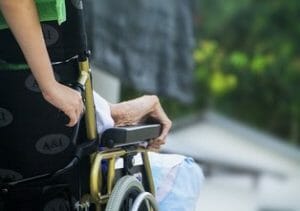Winchester, TN Elderly Abuse Lawyer
Nursing home inspections sometimes uncover dangerous conditions for residents. For example, an inspection at a Memphis nursing home in 2015 revealed 35 deficiencies, some of which created an immediate risk to residents’ health and safety. The inspection report from the Department of Health and Human Services Center for Medicare & Medicaid Services showed a pervasive pattern of neglect – failure to bathe residents, to provide them with clean clothing, or to clean resident rooms. For those violations and others, the nursing home has assessed a fine of $1.23 million.

Often, families are the first to notice signs of abuse. Physical wounds, behavioral changes, and an unkempt appearance may indicate a resident is in danger. If you believe a member of your family has suffered abuse in a nursing home, don’t wait to get help.
Call attorney John R. Colvin today to request your free consultation: 1-844-683-6229.
Categories of Elder Abuse

- Physical abuse – Deliberately inflicting pain
- Sexual abuse – Non-consensual sexual contact
- Exploitation – Theft or misuse of a person’s assets, identity, funds, or property for someone else’s benefit
- Emotional abuse – Inflicting emotional distress through words or actions
- Abandonment – Desertion by a caregiver
- Self-neglect – Failure of an individual to perform essential self-care in a way that creates a health or safety risk.
Symptoms of Abuse

A resident who is being harassed, intimidated, or threatened may become withdrawn or moody, and may avoid communicating with visiting family members. Staffers who are emotionally abusing residents may also try to prevent families from seeing their loved ones, both as a way to hide the abuse and to further isolate the resident.
Understanding Self-Neglect

Self-neglect can be a consequence of suffering other forms of abuse. After enduring ongoing abuse, people may experience a loss of self-esteem and feelings of shame and subsequently stop taking their medication, bathing, or eating.
Caregivers should be alert to such behaviors and work to remediate them. Unfortunately, in some nursing homes, workers are unconcerned when residents exhibit a rapid decline in their ability to care for themselves.
Isolation can have a profound impact on residents.
Protecting Loved Ones

A nursing facility that’s visibly dirty or smells bad may be unconcerned with resident hygiene. If staff members are unwelcoming, resistant to showing families around, and are openly hostile toward each other, they may be overworked or trying to hide deficiencies on the premises.
Families may ask to see an activities calendar, to learn how residents spend their day. A nursing home is not the same as a hospital, where patients are expected to stay in their rooms. Ideally, residents should feel free to roam and interact with each other and with staff. One possible sign of neglect is a home where no, or very few, residents are found in common areas.
Contact an Experienced Personal Injury Attorney

If you suspect a loved one’s health or safety may be endangered, call the state Human Services Department. The next call you make should be to an attorney who can advise you of your rights and how best to ensure a nursing home is held accountable for any harm to your family member.
John R. Colvin is an experienced personal injury attorney who has helped many Tennesseans put their lives back on track. Find out what our office can do for you. Request your no-obligation consultation by filling out our online contact form or by calling us at (931) 962-1044.

